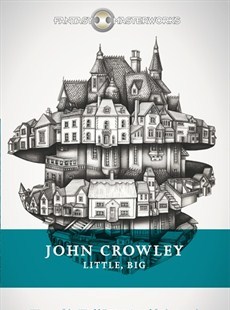Adventures in Bookland: Little, Big by John Crowley

How do you write about something that escapes words? It might sound like a relatively restricted problem – after all, we are an incessantly garrulous species whose rise has been intimately intertwined with our ability to speak and, later, to read – but in fact there are whole classes of experience that are almost impossible to speak or write about in any other way than by appealing to a shared experience of the subject in question. Take the smell of a rose. How on earth would it be possible to describe the perfume to someone who has never pushed their nose into one? The vocabulary we have for smells is dependent on analogies that only work if you have experienced something similar – simply an extension of the impossibility of describing red to a blind man. So language has limits of application to common areas of human experience.
But what about its application to uncommon areas of human experience? In Little, Big, John Crowley tries, and almost succeeds, in doing this. The area of human experience he deals with is the borderland between humanity and the Otherworld – not the spiritual realm of the heavens but the crossing dimensions of the Grey Folk. The people and places glimpsed in peripheral vision, the sudden recollection of a dream dreamt a month ago, the shimmer between being there and not being there. There is no language for this because it is an analogue, in human experience, to the quantum realm where the more precisely one knows the momentum of a particle the less one knows its position. The closer one looks the more it escapes from view (in astronomy, one has to look from the corner of the eye to see the faintest stars as the light-sensitive rod receptors are richer in peripheral vision).
In Little, Big, a family lives, in a house of indeterminate size and interdimensional complexity upon the story borders between this, prosaic, world and an Otherworld that is so other that, for the most part, it escapes description. Its presence is felt by its effect and the silence of those who have slipped over the border and come back changed. Crowley attempts to convey this through a rich prose style, studded with unusual words (Little, Big required me to repair to a dictionary to look up unknown words once every three or four chapters) and an allusive, elliptical story telling style. And he succeeds extremely well for most of the book, suggesting without stating the other worlds that impinge upon Edgewood, the big house on the edge, and its generations of inhabitants. In fact, I think it only really breaks down a bit when Crowley, towards the end, imposes a narrative upon the events, with manners all rushing towards a conclusion that has slipped from my memory in the way that the overall feel and mood of the book has not. A remarkable book that almost manages to express the inexpressible.
0 Comments